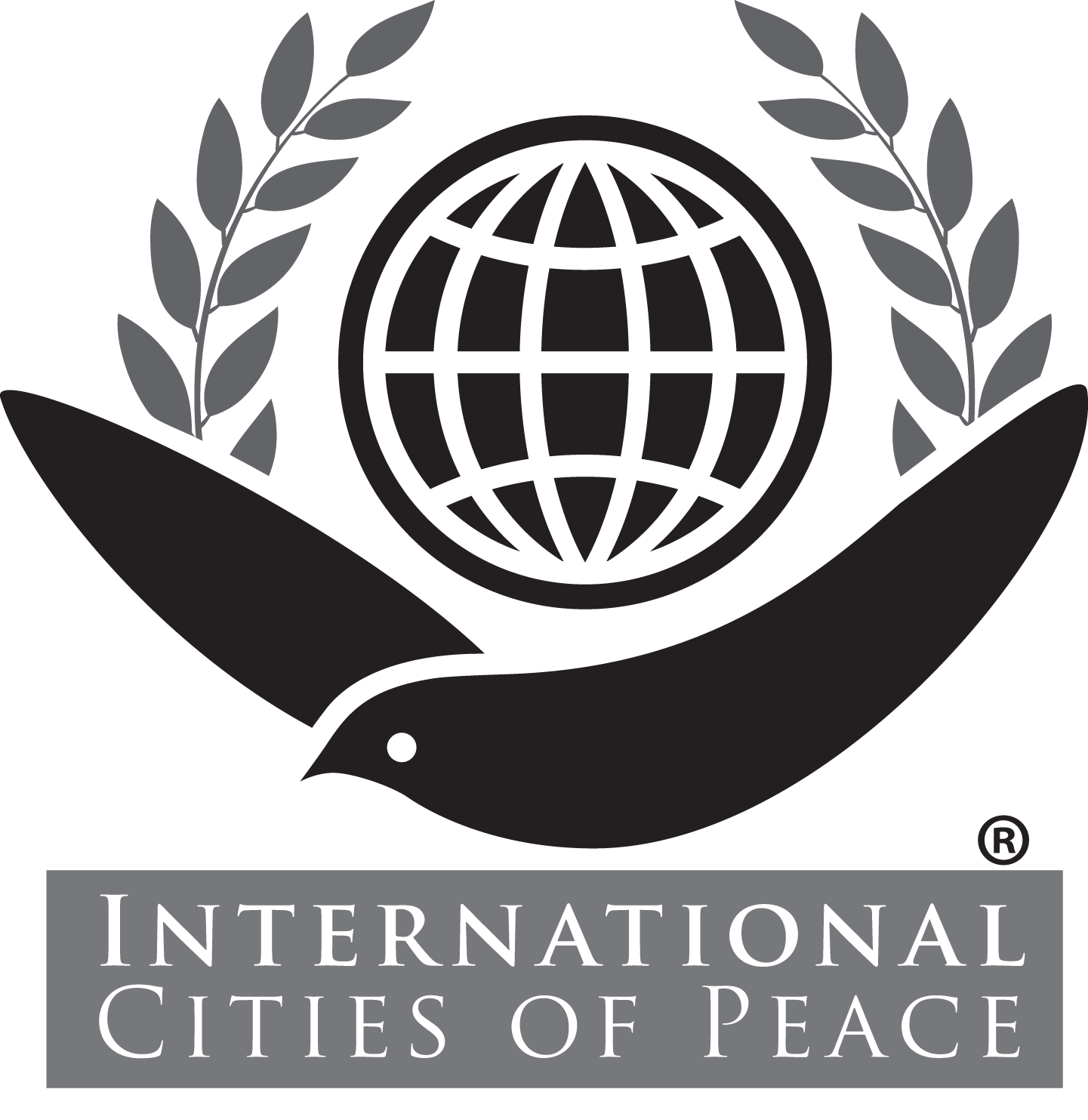Gaza City, Palestine: International City of Peace
We welcome Mr. Malek Yusef Abu Amra al-Husseini, founder of the Justice and Peace Party now establishing Gaza City as an International City of Peace based on advocacy and work for nonviolent progress in Palestine. In signing the Letter of Intent from International Cities of Peace, the community organization focuses on nonviolent methods of promoting safety, prosperity, and quality of life as the consensus values of peace.
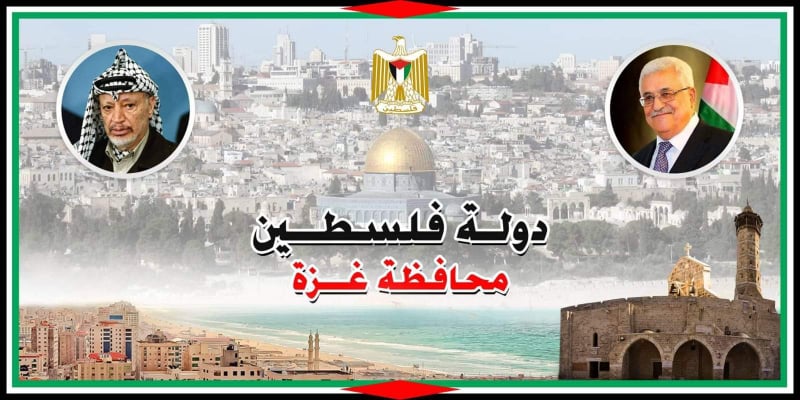
The three major Cities of the Gaza Strip will be added to the International Organization of International Cities for Peace over time. This global Palestinian initiative is starting with Gaza City on the national foundations and principles that preserve the rights of the Palestinian people, based on all international decisions and agreements that recognize the Palestinian state, its historic land, and its capital, Al-Quds Al-Sharif ; and City leaders will be appointed within the sector through a specific mechanism that is consistent with the terms of joining the initiative and implementing its global goals, which are based on international human rights law, global goals for sustainable development and world peace.
Introducing the Palestinian initiative “WIJPS – makers of justice and peace”, an independent Palestinian global initiative of the origin of “a private non-profit organization with party working on the same goals” consisting of a body that includes a group of members and activists in their various fields, working to promote internal peace and achieve global goals for sustainable development and spread a culture of global peace based on justice and protection human rights.
Note: Introduction page with information primarily at the time of joining International Cities of Peace. For updates, please contact the liaison.
All photos have been sent by the liaison, Mr. Malek Yusef Abu Amra al-Husseini: “All photos are of my rights and were taken by my media team during the war and immediately after the war.”
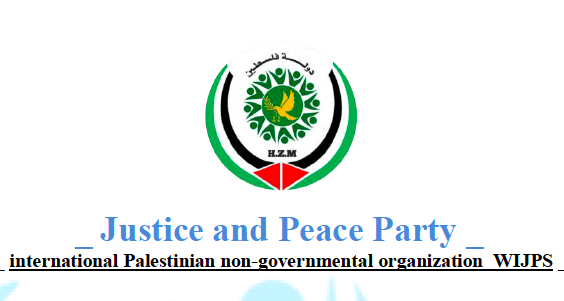
ABOUT THE JUSTICE AND PEACE PARTY (WIJPS)
VISION
The Justice and Peace Party is a non-governmental, independent Palestinian organization that aims to achieve world peace and protect human rights. In the region and the world, especially the rights of the Palestinian people, the party traces its origins to the Palestinian International Organization for Peace and Protection of Human Rights, which was founded by Secretary-General Malek Youssef Abu Amra al-Husseini .
MISSION
Contributing to Palestine as an agent for positive change in the world and working to achieve security and peace building in local and international societies by spreading the culture of peace, resolving and preventing conflicts, and enabling individuals and institutions to play their role in this field
MAIN GOALS
- Protecting human rights and spreading a culture of peace.
- Protecting the Palestinian people and their rights from any humanitarian and political violations.
- Conflict resolution and prevention at various research and training levels, and appropriate interventions where possible.
- Applying the value of non-violence and consolidating reconciliation in post-war societies.
- Applying restorative justice instead of punitive justice.
THE INTELLECTUAL PREMISE
- It aims to defeat occupation terrorism with its various ideas and sources through a full and deep awareness of the imminent danger and the formation of a force capable of confronting this threat with non-violence first and then by legal and legitimate means .
GENERAL GOALS
- Freedom, self-determination, and the establishment of an independent Palestinian state.
- Combating political, intellectual and religious extremism and resistance to dictatorship.
- Respecting freedom of opinion and expression, achieving justice, equality and the rule of law.
- Achieving Palestinian national unity and supporting internationally recognized Palestinian legitimacy in spreading and strengthening internal and global peace.
- Taking care of youth issues and improving their role in building society
- Enhancing the role of women and their participation in the Palestinian society regarding their rights and equality.
- Combating political, institutional and administrative corruption that is offensive to the nation and the citizen.
- Implementing the decisions of halting Israeli settlements, confiscating lands, oppression, siege, and judaizing Palestinian sanctities, by legitimate means and by all means of international law, based on the decisions of the United Nations General Assembly and its organizations regarding these issues.
- Work to ensure the rights of Palestinian refugees.
- Declaration of the Palestinian state, and linking its complete policy on the internationally recognized territories as occupied Palestinian lands in accordance with Security Council Resolutions No. 605 – 607 – 608, which are the territories of the Palestinian West Bank, including Jerusalem and the Gaza Strip, until the June 4, 1967 borders.
- Implementing UN Security Council and General Assembly resolutions 242-338-237- 425-194 regarding the rights of the Palestinian people.
- Achieving comprehensive peace based on justice and respect for the rights of the Palestinian people.
- Addressing all plans and liquidation projects for the Palestinian issue, discussing it with international legitimacy, and defending the Palestinian cause by just and legitimate means.
- Enhancing friendship with solidarity and cooperating countries and international organizations.
- Enhancing students ’role in building the nation and taking care of student affairs.
The goals of the organization are to:
- Contribute to Palestine as a factor for positive change in the world.
- Calling for a clear peace based on the principles of justice and respect for the human being.
- To protect and respect human rights in accordance with internationally known standards, covenants and agreement .
- Working to educate societies inside Palestine and the Middle East about the importance of preserving human rights and how to implement peace.
- Combating social exclusion by promoting a culture of peace, coexistence and respect for the law to enable justice, enjoy security and safety and achieve sustainable development.
- Resisting extremism, racism, dictatorship, violence and terrorism in all its forms and types, so that we can enjoy security, freedom, peace and live in dignity.
- Promoting the human being and preparing him to contribute to human development and develop the comprehensive sustainability of society, attributable to it by recovery, growth and prosperity.
- Protecting the rights of children and women, providing humanitarian assistance, and caring for people with special needs.
- Protecting and preserving the environment and supporting the mother nature to ensure its stability.
- Educating local and international public opinion about flagrant humanitarian and environmental issues related to damages, risks, and negatives and the impact of this on life and the future.
- Encouraging the language of dialogue, mutual understanding and respect between individuals and societies in terms of transgressions, different cultures, religions and beliefs.
- Activating the role of youth in societies to contribute to societal development and political and social reform.
- Follow up and document violations of human rights, humanitarian and environmental crimes •
- Work to strengthen bilateral relations and ties and cooperation with local cultural, humanitarian, humanitarian and legal institutions and bodies working on the same goals.
We urgently need peace within our societies, and in order for you to have an important, effective and influential role in achieving justice and building peace within Palestinian societies and the world at large, we must agree together first on the importance of peace for people and the importance of building people before building nations through the following:
- Appreciating and protecting the human spirit, overcoming violence, selfishness and hatred, and encouraging the language of mutual dialogue on understanding and respect.
- Respect for freedom of opinion and expression and its use without tampering with religious issues that anger people.
- Promoting peace by spreading its ethics, which are love, tolerance, equality, justice and respect for human rights.
- Respecting all religions, religious beliefs and ethnic differences, rejecting extremism, racism and dictatorship, and addressing the effects of their successors.
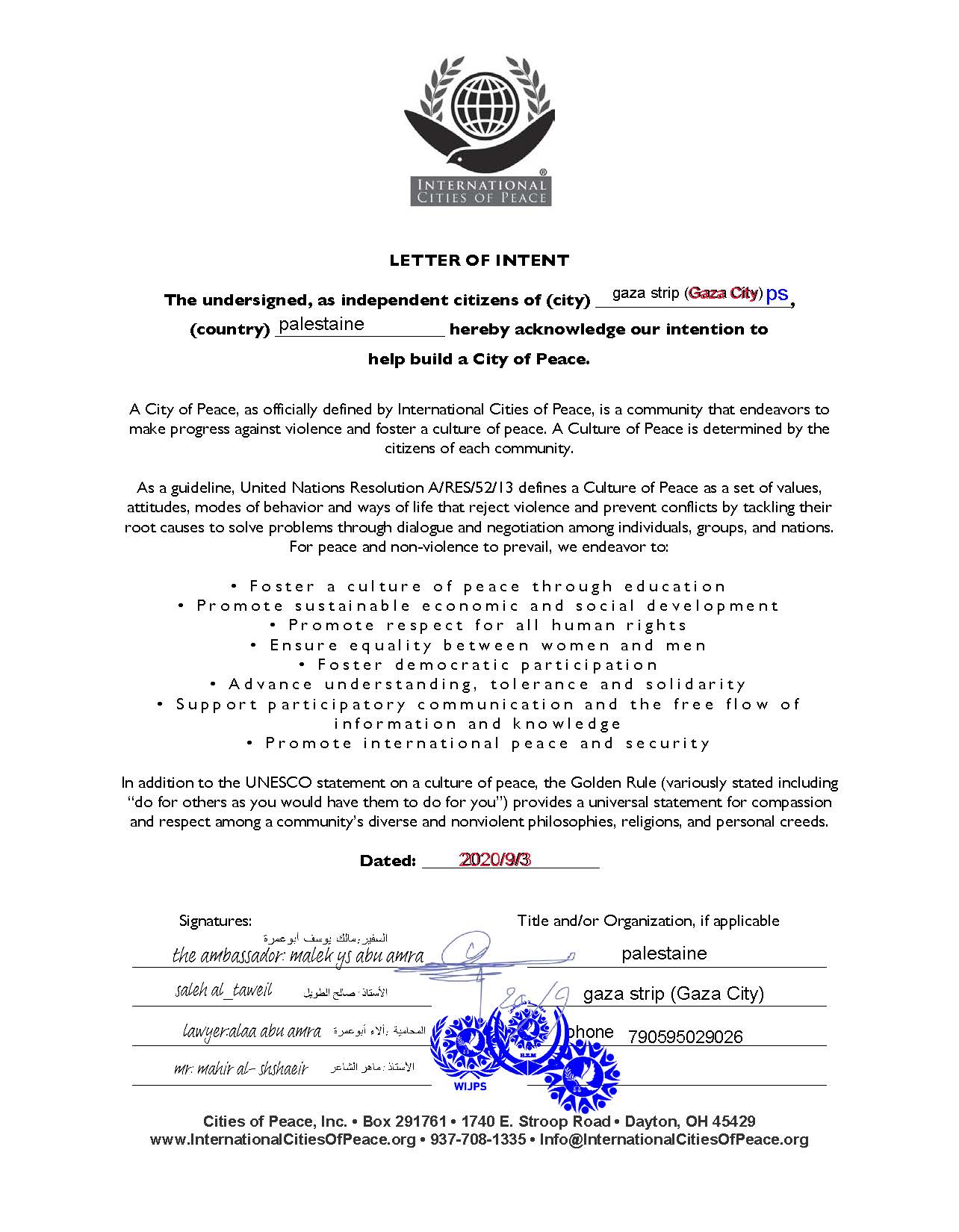
LETTER OF INTENT
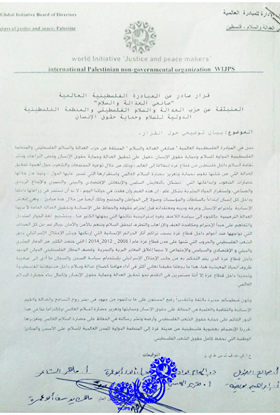
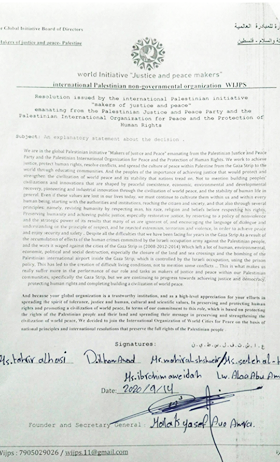
THE IMPORTANCE OF ESTABLISHING PEACE
There are many benefits for establishing and achieving peace in societies, which make it of great importance in achieving growth, progress and stability in all aspects of life in these societies, such as social and political stability, which is achieved by achieving equality and justice among members of the same society.
Peace plays a big role in resolving conflicts between members of the same community and solving their problems. When a person feels that he is living in peace and security, he will never resort to violence or take the right of others.
The results of achieving peace and establishing peace in countries and societies are the building and continuation of the civilizations of these countries and societies. There are some peoples and civilizations that have disappeared and their identity has been smeared due to the wars and conflicts that existed in their societies and the absence of peace in them.
Basic pillars for establishing peace that must be known:
There are many basic pillars that must be available in any society or any political administration to achieve and establish peace, including the wise management of pluralism in society. There is no society in which there are no differences, whether in race, religion, or cultural and political trends, and the political administration in This society achieves the principle of equality and justice in the rights of members of a single community regardless of these differences that exist among them, especially minorities.
- Freedom for all citizens of the state.
Peace is achieved in societies where there are some differences in race, religion and political trends by leaving space for each group of them to practice their religious, cultural or political rituals with complete freedom without violating the laws that urge not to harm or harm members of society or the state as a result of practicing This ritual, this freedom is the most basic rights of citizens due to the state.
- Equality between groups of people
The importance of equality in rights between different members of society in terms of race, religion or politics comes to extinguishing the fire of sedition among them, as the fire of hatred and hatred spreads among members of society as a result of preferring or leaving space for one group to express over the other, which results in internal wars and conflicts that can It leads to the political, social and economic demolition of the state. The pillar of equality between members of society before the law is through the application of justice to all groups of society regardless of their religious, ethnic or sectarian affiliations, or even their political and social affiliations, thus achieving peace between these individuals and extinguishing the fire of sedition. And hatred among them
- Justice and reforms in various fields of life
Sound and just governance is one of the basic pillars of achieving peace in society through achieving democracy in governance and fighting corruption and individuals obtaining their full rights without discrimination as a result of any difference in religion, race or sect, in addition to providing all necessary and necessary services for a decent life for individuals Society, including education, health, means of transportation, and adequate housing, as well as encouraging community members to participate and volunteer in the field of public work and charitable work is one of the most important methods of sound governance that achieve peace in societies.
TYPES OF PEACE
- Positive Peace
There are many forms or types of peace, and positive peace is one of the types of peace, which is peace that is achieved during the absence of indirect violence in societies, and positive peace is achieved through achieving harmony and harmony among members of the same community regardless of the differences between them, especially religious or ethnic differences.
- Negative Peace
Negative peace is the second type of peace, which is defined as peace that is achieved during the absence of direct violence in states or societies, and this type of peace is achieved when there is a peaceful coexistence between members of a single community without the establishment of wars and conflicts between them as a result of the differences existing between members of this community.
When achieving negative peace in societies, it is not required that these societies feel peace or coexist in dignity in their countries, and this matter is one of the strange paradoxes that characterize negative peace.
Negative peace can be established in some societies, but it is matched by a state of neglect and lack of interest in meeting the community’s needs in terms of necessary services or for its members to obtain their full rights in it, which makes the individual feel trapped in his community and dominated by a force that makes him always live in a state of weakness, fear and anxiety.
Barriers to establishing peace
There are many obstacles and obstacles that hinder the establishment and achievement of peace in societies, such as the conflicts that exist between the major countries in the world that object to any decision related to achieving peace in a place, such as the right of veto or objection that the major countries use in the Security Council, where these countries consider to achieve its own interests without considering the general interest of achieving peace in the world or somewhere.
- Religious, ethnic or sectarian extremism and fanaticism play a major role in impeding the achievement of peace in societies, as this extremism or intolerance results in spreading a spirit of hatred and hatred among members of the same society, and igniting the fire of sedition and conflicts among them, which leads to the use of violence and the outbreak of internal wars that It destroys the establishment of peace between members of a single community, and sectarian division may occur by people from outside the state with the aim of destroying the internal structure of social relations within a single society
- Some major countries seek to obstruct and destroy peace in some other places or countries, especially developing and poor countries, in order to seize their natural resources such as oil and natural gas as well as their economic resources, and this is one of the most important obstacles to establishing peace.
And because resolving the Arab-Palestinian-Israeli conflict plays a major turning point in achieving world peace, it must be achieved through the following:
- Building a clear and just peace based on the foundations of justice and respect for human rights in accordance with all agreements.
- To stop killing Palestinians and violating their rights, property and sanctities, and appreciating and protecting the human spirit internationally.
- Refer to the international agreements that preserve the rights of peoples and humanity, especially the rights of the Palestinian people.
- Stopping the Israeli settlement, land theft, digging beneath sanctuaries, theft and forgery of Palestinian antiquities, stopping the administrative detention and imprisonment of Palestinians without charge, and implementing the decisions of the United Nations General Assembly, the Security Council and UNESCO regarding these issues.
- The immediate implementation of the Israeli occupation of the internationally agreed upon international agreements and the implementation of its decisions regarding the rights of the Palestinian people.
- Pay compensation to the Palestinian people for the losses they incurred in human spirit, the environment, nature, infrastructure losses and destruction over those previous years due to the impact of those wars and human crimes on Palestine, notably the Gaza Strip, as well as continuing to settle lands, burn Palestinian trees, and demolish indigenous homes.
- Resorting to international legislation in resolving international disputes, such as the International Criminal Court and international legality.
PALESTINIAN INTERNATIONAL ORGANIZATION FOR PEACE AND HUMAN RIGHTS
The Palestinian International Organization for Peace and Human Rights carries with the same aims, name and logo as “WIJPS “. We are currently working on establishing it inside Palestine and its headquarters will be in the Gaza Strip, as it is the place of origin and residence for the work team and the owner of the intellectual property and the founder Mr. Malek YS Abu Amra.
The organization’s work locally is centered on :
- Monitoring and documenting human rights violations in the occupied Palestinian territories, especially human, environmental, economic, social and cultural rights, committed by the Israeli occupation forces on the one hand, and responsible Palestinian parties on the other.
- Following up the file of the Palestinian political division and addressing its effects that led to the deterioration of economic, political and social conditions since its establishment in the Gaza Strip 2007.
- Establishing workshops, dialogues, and cultural and intellectual discussions that address human rights issues and ways to promote a culture of peace and societal peace that targets youth and their different fields.
- Providing information on human rights issues to NGOs working in the field of human rights.
- Referring the victims to the competent authorities and resolving civil disputes by humanitarian or legal means.
- Providing various training courses targeting all segments of society.
- Protecting the rights of children and women and caring for people with special needs . •
- Providing humanitarian aid to the needy, if available.
- Strengthening bilateral relations and cooperation with local cultural, humanitarian and legal institutions and bodies working to achieve the same goals.
The organization’s work internationally focuses on:
- Contributing to Palestine as a factor for positive change in the world.
- Defending the rights of the Palestinian people and fighting crimes and violations against it by the Israeli occupation and raising them internationally.
- Providing information on human rights violations in the occupied Palestinian territories and sharing them with international and organizations concerned with peace and human rights.
- Delivering the Palestinian voice to the outside world and the global community of institutions, international organizations and the media.
- Participate in the global initiatives emanating from international peace and human rights organizations that represent states, share ideas, and exchange dialogue on global humanitarian issues specific to countries, which would help in providing solutions and support to such issues.
- Strengthening bilateral relations and cooperation with international humanitarian, legal and cultural organizations working to achieve the same goals for the organization and global goals for sustainable development.
The legacy of the Palestinian civilization of peace
It was and still is based on four pillars specific to this historical land and its people since ancient times, namely religious sanctities – respect for difference – religious – cultural and diversity in general, trade and economy, and their geographical location. Therefore, the Gaza Strip has a large part of this great legacy throughout the ages, as it represents an integral part of this land, Palestine and its people.
It is important for everyone to know that this great Palestinian legacy has many fruits and beneficial results for the state and the people with a lot of peaceful coexistence, safety, and economic, pioneering, industrial and developmental recovery like other countries and peoples of ancient civilizations.
However, it is also important to note that these results are no longer enjoyed by the Palestinian people, but rather they are no longer possessed as before from the beginning of the British occupation up to the Israeli occupation where human crimes are against all groups of the Palestinian people to use force, violence, terrorism and displacement, the violation of Palestinian sanctities of religious diversity, the continuous settlement of the Palestinian lands, the administrative detention devoid of evidence and charges for some detainees and the forced control of the pillars of the Palestinian state and its own administration and dealing with its people by the occupation.
The Israelis with all arbitrary methods devoid of humanity and a sense of conscience, justice and morals and, rather despite all these difficulties facing the Palestinian people, the Palestinian National Authority representing its people at the local and international levels is still sending to the world the most beautiful examples of the legacy of its civilization and the civilization of global peace by continuously addressing the political issues of its people in all high-end and just ways and monitoring the gates of sedition that it leads to violence and conflicts and their closure permanently and combating general terrorism, as it has proven its important role internationally in protecting and promoting global peace by providing aid and humanitarian and economic services in terms of health, environment and education within the affected communities and regions in Africa, Asia and many countries and various regions in this world.
ABOUT THE LIAISON
Mr. Malek Yusef Abu Amra al-Husseini is a resident of the Gaza Strip, where he was born and resides. He studied in the general secondary literary branch, then he completed his studies in a diploma in alternative energy systems. He also achieved another diploma in the field of human development.
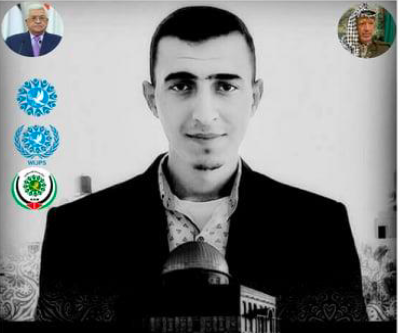
Malek is founder of the Justice and Peace Party:
- Member of the Fatah movement represented by Palestinian President Mahmoud Abbas
- Member of Amnesty International
- Member of the International Union for Human Development
- Representative of the International Committee of the Blue Cross and Blue Crescent inside the Gaza Strip
- Ambassador of the International Organization of the Blue Cross and Blue Crescent. •
Mr. Malek Ysef Abu Amra al-Husseini was awarded a Global Peace Ambassador and Goodwill Ambassador distinguishment.
Team members

CONTACT INFORMATION
ABOUT GAZA CITY, GAZA STRIP, PALESTINE (Submitted by the leader from a variety of source materials)
It is one of the largest Palestinian cities within the Gaza Strip, and is considered a coastal city geographically located to the north of the Gaza Strip, on the southern side of the eastern Mediterranean coast, on a hill with a height of 45 feet, where it is located to the southwest of Jerusalem, and the area of its land 56 km², as it is called Gaza Hashem, and the city was founded in the fifteenth century BC, by the Canaanites It was also occupied by many occupiers such as the Greeks, Pharaohs, Romans, and others, and it was also under the Ottoman Caliphate, which is all the Palestinian lands.
It is located astronomically at 34.48333 longitude in the east of the country. Greenwich line, and it is located at a latitude of 31.51667 north of the equator. Gaza is considered one of the most crowded Palestinian cities compared to its area, with a population of seven hundred thousand people according to the statistics of 2013 AD, and from the religious point of view, Gaza City is completely empty of the Jewish population, as The vast majority of the population is Arab Muslim, in addition to about 3,500 adherents of Christianity, most of them Roman Catholics, Baptists and Greek Orthodox living in peace and security with the many Muslim families and clans here who also have origins from the Bedouins and ancient Arab tribes.
Archaeological monuments inside Gaza City:
There are many historical monuments that have proven peaceful coexistence, as the city includes many Christian, Roman and Islamic monuments of a diverse religious, cultural and historical character within the Gaza Strip, which are represented in the markets, mosques, palaces, schools, churches, baths, antiques and monuments. And the library that contains many manuscripts. Which proves its important role in preserving the continuation of the Palestinian civilization and the legacy of the civilization of world peace throughout the ages, and among these historical monuments, (St. Porphyrios Church, Al-Omari Mosque, Al-Sayed Hashem Mosque, Hammam Al. – Samar is an Ottoman monument, and the city of Beit Jleem, which belongs to To the Canaanite times, the Monastery of Saint Hilarion, the Greek Orthodox Church, the Sunni Ahmadiyya Zawiya, and the Caesarea market also contributed to this. This made it an important tourist and commercial place and a destination for visitors, merchants and researchers, especially its strategic location on the Mediterranean coast.
Trade in Gaza
The city was and still is an important center in terms of its strategic location between the Asian and African continents and its location on the Palestinian coast of the Mediterranean Sea, making it an important port for trade, fishing, import and export. It also contributes to building and protecting the economic recovery cover inside the city.
Industry and agriculture
The city is famous for its soap making, pottery industry, embroidery, spinning, and traditional rugs made of cattle wool ,It is also famous for making cotton clothes and weaving, making glass, and making bamboo furniture.
The city is famous for the cultivation and export of flowers, and the cultivation of crops, such as: barley, wheat, and cotton, and exporting them to countries of the world, and there are many oranges in which citrus fruits are grown, such as: oranges and lemons, and many plantations of potatoes, grapes, cucumbers, figs, strawberries, cantaloupe, watermelon and tomatoes.
The infrastructure of Gaza City for services, health, education, transportation:
Education
There are six universities in Gaza City, namely: the Islamic University – Gaza, Al-Azhar University – Gaza, Al-Aqsa University – Gaza (formerly the Faculty of Education), Palestine International University and Al-Quds Open University, and it adopts an open education system. There are also several intermediate colleges: including the Palestine Technical College in Deir Al-Balah, the College of Science and Technology in Khan Yunis, and many governmental vocational, training and educational centers, and also affiliated with the Ministry of Higher Education and the Relief and Works Agency (UNRWA).
Health and Services
There are also many health and service centers that aim to care for human health and protect the environment, which are divided into two parts within Gaza City (municipalities – hospitals and clinics) and the most important of these health centers are (Al-Shifa Medical Hospital and Al-Quds Hospital of the Palestinian Red Crescent Society) and health clinics Of the United Nations Relief and Works Agency (UNRWA) of the United Nations General Assembly.
As for the municipalities, they are among the most important Palestinian centers concerned with preserving the environment and citizens’ services, such as extending electricity networks to residential facilities and factories within the city, and supervising water wells and public water supplies. Homes, providing sanitation networks for homes, disposing of garbage, maintaining the cleanliness of society, .building playgrounds for youth and practicing sports, notably building public parks for citizens
Transport and Communications
The transport and communications sectors are considered one of the most important sources of infrastructure for countries, and among the most important of these sectors within the Gaza Strip are the main roads branching out between residential facilities and institutions, leading to the land crossings of the Gaza Strip, which are controlled by the Israeli occupation and, through which only travel, import and export takes place, and the Gaza sea port, which was destroyed by the Zionist occupation, Not to mention Gaza International Airport, which is 40 km from Gaza City, which was bombed and destroyed by the Israeli occupation planes in September 2000.. This is what negatively affected the economy of Gaza City and securing the economic recovery of the population inside the Strip in general, which in turn is based on providing stability for the financial movement within the city, not only providing food security for citizens and also providing jobs for them, to live in a decent life free from poverty and instability in general.
There are many difficulties that all residents of the cities and villages of the Gaza Strip go through, notably Gaza City, about which the whole world does not know and that is due to the wars and crimes waged by the Israeli occupation and the remnants of its war, including human losses, material losses, and a general blockade, all of which contributed to proving the Israeli occupation’s attempt to eliminate Palestinian rights, obliterate the legacy of the Palestinian civilization of peace and undermine world peace and apply it only in accordance with the implementation of its goals and policies in getting rid of the Palestinian people
The most important of these issues concerning the Gaza Strip and Gaza City can be reviewed as follows:
1- The war on Gaza resulted in 1410 deaths, including (355) children, (240) women, (134) policemen, (1032) civilians, and (18) as a result of assassinations, and the number of injured reached (5380), of whom ( 1872) children and (800) women.
2-The war left many people whose lives ended with a physical disability of all kinds, so that the number of people with special needs due to the Israeli occupation in different age groups and gender (48,140) individuals.
3- Due to the severe restrictions imposed on the water supply and drainage system in Gaza. The six main wells are no longer functioning for drinking water, and about 50% of the population does not have regular access to water. Every day, about 20 million liters of raw sewage and 40 million liters of partially treated water leak into the Mediterranean due to power cuts and the lack of fuel and spare parts in the treatment plants in the Gaza Strip.
4- The inability to find a solution to dispose of garbage from the cities of the Gaza Strip in streets, roads and wells, and flooding of sewage water causes the risk of outbreaks of diseases and insect epidemics, as well as mice and in residential areas.
5 – The war caused massive destruction to the infrastructure throughout the Strip; Due to the violent and continuous bombing operations around the clock throughout the war, as 50% of the water networks and 55% of the electricity networks were destroyed.
6 – As a result of strict restrictions on fuel and electricity by the Israeli occupation; Hospitals are currently experiencing permanent power cuts of 8-12 hours per day. There is currently a shortage of 60-70 percent of the diesel fuel needed for generators, and permits have been denied for 18.5% of patients who submitted permits to receive emergency treatment in hospitals outside the Gaza Strip and permits are still being denied and restrictions placed.
7 – An increase in the number of unemployed Palestinian youth in the Gaza Strip by 217,100 people of all genders and age groups.
8 – The war destroyed (11,122) houses, of which (2,627) were totally destroyed and (8,495) partially destroyed. This resulted in the displacement of its residents and dispersed among the homes of relatives or friends, or resorting to schools, or the establishment of tents on the rubble of homes.
9 – Destruction of (581) public institutions, of which (149) were totally destroyed and (432) partially destroyed, (31) non-governmental organizations headquarters, (53) United Nations institutions, and (60) health institutions, including ( 15) A hospital was hit by the bombing, and 29 ambulances were destroyed. ( 3,900 )
10- Industrial establishments stopped working, and more than (40) thousand people lost their jobs in the agricultural sector, and (90) thousand people lost their jobs in various sectors, which raised the poverty rate in the Gaza Strip to (79) percent, according to According to United Nations statistics, (88) percent of the total population of the Gaza Strip applied for food aid.
11- The war caused widespread destruction of crops, as it uprooted 396599 fruitful trees and 51699 unfruitful trees, and destroyed 999.785 donums of vegetables .
12- Destruction of (695) commercial establishments, of which (165) establishments were totally destroyed and (528) partially destroyed.
13- Destruction of (650) vehicles, of which (334) vehicles were completely destroyed and (316) partially destroyed as a result of the destruction of the various sectors and the continuation of the Israeli blockade of the Gaza Strip.
14 – The economic crisis worsened; Consequently, the Palestinian National Authority bears more financial burdens; Being responsible for managing Palestinian affairs in all the governorates of the homeland in the West Bank and the Gaza Strip.
15- The expansion of the circle of Israeli interference in the region After signing an agreement with the United States of America that gives Israel, along with the United States and the NATO countries, the freedom to search any vessel under the pretext of preventing weapons from reaching the Gaza Strip.
16- The war deepened the internal Palestinian division, as new problems and complications appeared in the Palestinian-Palestinian relations, such as the responsibility for receiving reconstruction funds, supervising the operation, and supervising the Rafah crossing, in addition to the mutual media campaigns.
17- The war showed the extent of the Arab division, as unified positions were absent, and opinions differed as to how to get out of the crisis.
18- The war ended with a return to the calm square, and Hamas and the other Palestinian resistance organizations stopped firing rockets.
Note: If information or photos used here are copyrighted, please contact us and we will immediately delete the copyrighted material.
